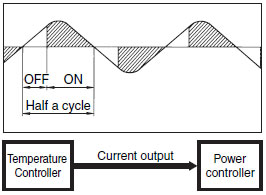Question
In PID control, what are the differences between ON/OFF time-sharing proportional control, cycle control, optimum cycle control, and phase control?
Answer
G3PX Phase Control

1.The output amount is changed each half cycle, enabling high accuracy temperature control.
2.More finely tuned control enables resistance to external disturbances and few heat shocks, thereby extending the service life of the heater.
3.The gradient can be set as desired, and so the output amount can be set when a Power Controller is used in a set with a Temperature Controller.
4.Inrush current can be suppressed by using a soft start or a constant-current circuit.
5.Noise occurs due to phase control.
G32A-EA and Solid-state Relay Cycle Control

1.The output cycle of the voltage output enables detailed control with a short cycle, which achieves temperature control with greater precision than ON/OFF time-sharing proportional control.
2.Manual control without the use of Temperature Controllers can be achieved.
ON/OFF Time-sharing Proportional Control

1.ON/OFF time-sharing proportional control is the most widely used control method in combination with Temperature Controllers.
2.Frequently turning the power supply ON and OFF ill shorten the service life of the heater.
3.This method is suitable for controlling items with a large heat capacity, which are difficult to heat and cool.
| Controllability Response | Space | Cost | Noise | Temperature Controller output | ||
| Phase | Best | Good | Good | Acceptable | Analog current | |
| Cycle | Good | Good | Good | Best | Analog current | |
| ON/OFF time sharing | SSR | Good | Best | Good | Best | Pulse voltage |
| Relay | Acceptable | Best | Best | Acceptable | Relay | |
Recommended Products
 MY
MY
New Latching Levers for Circuit Checking Added to Our Best-selling MY General-purpose Relays
 LY
LY
Power-switching Compact General-purpose Relays
 G3PE (Three-phase)
G3PE (Three-phase)
Compact, Slim-profile SSRs with Heat Sinks. Solid State Contactors for Three-phase Heaters Reduced Installation Work with DIN Track Mounting.
Other Power Controllers FAQ
-
 Which terminals should the G3PX Power Controller inputs be connected to?
Which terminals should the G3PX Power Controller inputs be connected to?
-
 Can three G3PX Power Controllers for single-phase applications be combined for control of three-phase loads?
Can three G3PX Power Controllers for single-phase applications be combined for control of three-phase loads?
-
 What are the conditions for detecting disconnection for G3PX-2[][]EHN-CT Power Controllers that detect disconnection for multiple heaters?
What are the conditions for detecting disconnection for G3PX-2[][]EHN-CT Power Controllers that detect disconnection for multiple heaters?


